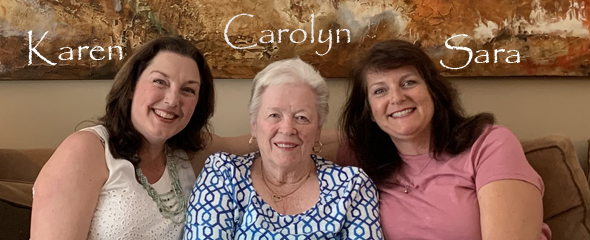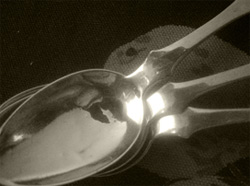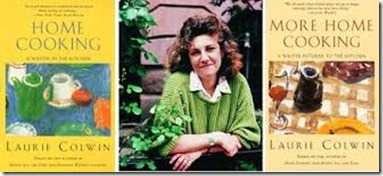The world lost a wonderful writer when Laurie Colwin died in 1992, very young (48) to a heart attack. I remember opening my issue of Gourmet that month to read the unbelievable news that Colwin had died suddenly. There was no explanation about what happened. I’d been a fan of her writing for many, many years. I adored her essays in the magazine, and had purchased her first food essay collection, Home Cooking: A Writer in the Kitchen (Vintage Contemporaries). I loved the stories – most of them were from her many years of writing for Gourmet. Her writing style was so witty, folksy, down to earth. But loving, and matter-of-fact. She shared simple recipes, but with a charm and verve that made you just want to go right to the kitchen and make her beef stew. Or her gingerbread. Or her creamed spinach with jalapenos.
Recently I moved some of my cookbooks and other books related to cooking from my kitchen/family room area to my upstairs office. Books I don’t refer to with any frequency made the transition along with various cookbooks I can’t bear to part with, but don’t use much. When I came upon the Home Cooking book, I decided to set it aside and it’s been sitting in the book rack in one of our bathrooms for about 2-3 months. Even my DH has picked it up from time to time and enjoyed reading a story. I’ve just finished reading it from cover to cover, with a renewed enthusiasm for making some of her recipes (of which there are few). There are several quotes that I found so humorous, so I decided to share some with you. I don’t think I’m allowed to completely write one of her essays here, but bits and pieces are okay, I think. Perhaps they’ll pique your interest – enough to buy the book yourself.
In the Forward of the book, Colwin wrote a little explanation about her love of food and socializing in the presence of food.
Unless you live alone in a cave or hermitage, cooking and eating are social activities; even hermit monks have one communal meal a month. The sharing of food is the basis of social life, and to many people it is the only kind of social life worth participating in.
No one who cooks cooks alone. Even at her most solitary, a cook in the kitchen is surrounded by generations of cooks past, the advice and menus of cooks present, the wisdom of cookbook writers. In my kitchen I rely on Edna Lewis, Marcella Hazan, Jane Grigson, Elizabeth David, the numerous contributors to The Charleston Receipts, and Margaret Costa (author of an English book entitled The Four Seasons Cookery Book).
One of the delights of life is eating with friends; second to that is talking about eating. And for an unsurpassed double whammy, there is talking about eating while you are eating with friends. People who like to cook like to talk about food. Plain old cooks (as opposed to the geniuses in fancy restaurants) tend to be friendly. After all, without one cook giving another cook a tip or two, human life might have died out a long time ago.
Perhaps Colwin’s most famous essay is the one entitled “Alone in the Kitchen with an Eggplant.” It is, without a doubt, my favorite food essay ever, and I’ve opened this book more than once just to read this chapter. Colwin was young and an aspiring writer back then, and had to economize in order to even live in New York City. She rented an apartment that would likely drive a normal person off the edge, but to Colwin, it had charm in spades. Here’s what she wrote:
For eight years I lived in a one-room apartment a little larger than the Columbia Encyclopedia. It is lucky I never met Wilt Chamberlain because if I had invited him in for coffee he would have been unable to spread his arms in my room which was roughly seven by twenty.
I had enough space for a twin-sized bed, a very small night table, and a desk. This desk, which I use to this day, was meant for a child of, say, eleven. At the foot of my bed was a low table that would have been a coffee table in a normal apartment. In mine it served as a lamp stand, and beneath it was a basket containing my sheets and towels. Next to a small fireplace, which had an excellent draw, was a wicker armchair and an ungainly wicker footstool which often served as a table of sorts.
Instead of a kitchen, this minute apartment featured a metal counter. Underneath was a refrigerator the size of a child’s playhouse. On top was what I called the stove but which was only two electric burners – in short, a hot plate.
Many people found this place charming, at least for five minutes or so. Many thought I must be insane to live in so small a space, but I loved my apartment and found it the coziest place on earth.
My cupboard shelves were so narrow that I had to stand my dinner plates on end. I did the dishes in a plastic pan in the bathtub and set the dish drainer over the toilet . . .
When I was alone I lived on eggplant, the stove top cook’s strongest ally. I fried it and stewed it, and ate it crisp and sludgy, hot and cold. It was cheap and filling and was delicious in all manner of strange combinations. If any was left over I ate it cold the next day with bread. . .
In this tunnel-like dollhouse of an apartment, Colwin often entertained, but only a party of three. Four made impossible logistics. She often served soup – a one pot wonder. Usually she brought in dessert. I’ve tried to envision an apartment 7 feet wide by 20 feet long, which had to have included a bathroom of sorts, thereby leaving very little space left for living. Yet Colwin found it absolutely comforting and homey. She always preferred to eat at home rather than go out – she was a champion of good old-fashioned kinds of home cooking. Nothing fancy was her motto. One of her mantras was about salt – lots of it – and seasoning everything with celery salt too.
Eventually Colwin married – moved into a more normal sized house – and had a daughter. She continued to write. Including numerous novels. Here’s a link to her many published works. None is available on the Kindle.







Lee
said on March 27th, 2013:
Thank you for this….I feel exactly the same about Laurie and have reread her food essays more times than I can count! Xo
I wish I owned all of her books – about the only place you can find them is in dusty old used bookstores . . . carolyn t
Ann Webb
said on April 2nd, 2013:
I, too, love Laurie Colwin. I think that I have read all of her books, fiction and nonfiction. I keep Home Cooking and More Home Cooking next to my bed, and have for about 10 years! Ann W.
I was sure there were many Laurie Colwin fans out there. Just last night I found my hard-cover copy of More Home Cooking. I knew I had it, but couldn’t find it! Now I can renew my acquaintance with those stories as well. She was such a witty writer. . . carolyn t